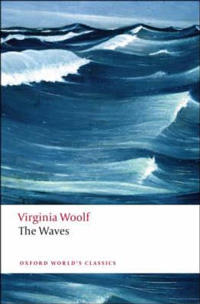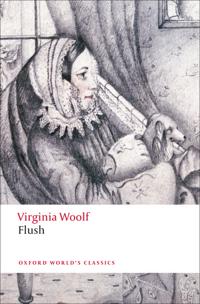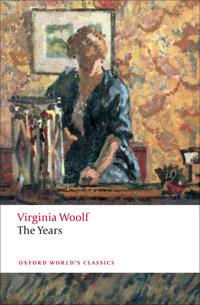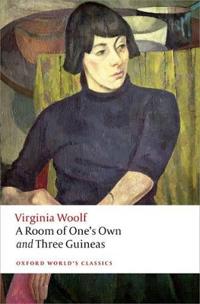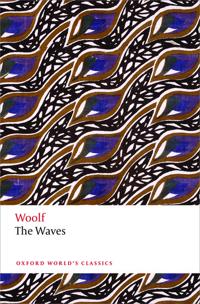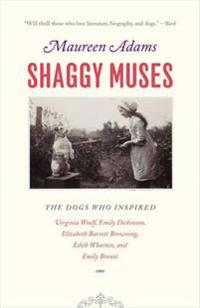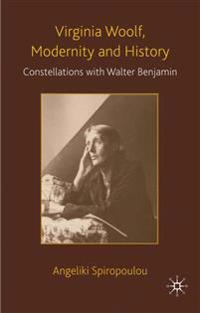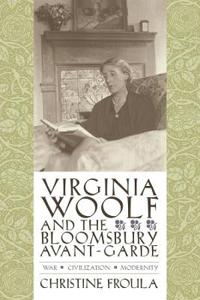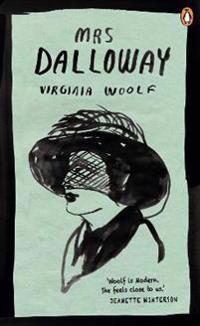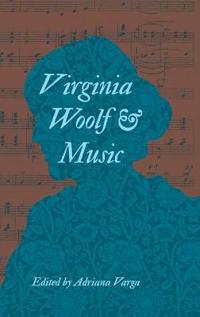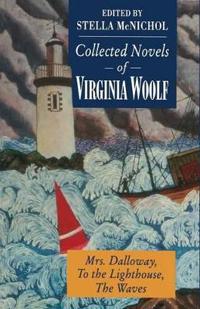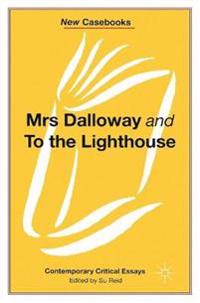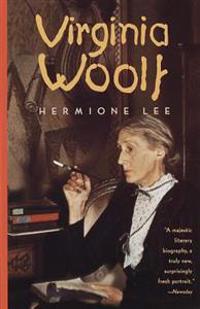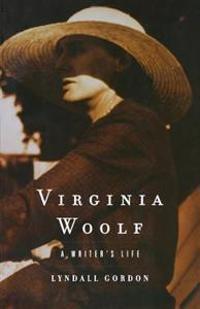The Waves (Häftad)
avVirginia Woolf
ISBN: 9780199536627 - UTGIVEN: 200806Woolf described this work on the title-page of the first draft as 'the life of anybody'. The Waves (1931) traces the lives and interactions of seven friends in an exploratory and sensuous narrative. The Waves was conceived, brooded on, and written during a highly political phase in Woolf's career, w[...]
Flush (Häftad)
avVirginia Woolf
ISBN: 9780199539291 - UTGIVEN: 200903'I lay in the garden and red the Browning love letters, and the figure of their dog made me laugh so I couldn't resist making him a Life.' Throughout her career, Woolf invokes the animal world both directly and metaphorically. She started to write a biography of Elizabeth Barrett Browning's spaniel [...]
The Voyage Out (Pocket)
avVirginia Woolf
ISBN: 9780199539307 - UTGIVEN: 2009-08-01In The Voyage Out, one of Woolf's wittiest, socially satirical novels, Rachel Vinrace embarks for South America on her father's ship, and is launched on a course of self-discovery in a modern version of the mythic voyage. Lorna Sage's Introduction and Explanatory Notes offer guidance to the reader n[...]
The Mark On The Wall And Other Short Fiction (Pocket)
avVirginia Woolf
ISBN: 9780199554997 - UTGIVEN: 2008-12-11The Years (Häftad)
avVirginia Woolf
ISBN: 9780199555390 - UTGIVEN: 200905As the Pargiters, a middle-class English family, move from the oppressive confines of the Victorian home of the 1880s to the 'present day' of the 1930s, they are weighed down by the pressures of war, the social strictures of patriarchy, capitalism and Empire, and the rise of Fascism. Engaging with a[...]
Night And Day (Pocket)
avVirginia Woolf
ISBN: 9780199555604 - UTGIVEN: 2009-01-29Katherine Hilbery, torn between past and present, is a figure reflecting Woolf's own struggle with history. Both have illustrious literary ancestors: in Katherine's case, her poet grandfather, and in Woolf's, her father Leslie Stephen, writer, philosopher, and editor. Both desire to break away from [...]
Selected Essays (Pocket)
avVirginia Woolf
ISBN: 9780199556069 - UTGIVEN: 2009-10-01This selection brings together thirty of Woolf's best essays across a wide range of subjects including writing and reading, the role and reputation of women writers, the art of biography, and the London scene. They are enchanting in their own right, and indispensable to an understanding of this grea[...]
Virginia Woolf (Pocket)
avMichael Whitworth
ISBN: 9780199556083 - UTGIVEN: 2009-04-23Political and social change during Woolf's lifetime led her to address the role of the state and the individual. Michael H. Whitworth shows how ideas and images from contemporary novelists, philosophers, theorists, and scientists fuelled her writing, and how critics, film-makers, and novelists have [...]
A Room of One's Own and Three Guineas (Häftad)
avVirginia Woolf
ISBN: 9780199642212 - UTGIVEN: 2015-03'Intellectual freedom depends on material things. Poetry depends on intellectual freedom. And women have always been poor...' In these two classic essays of feminist literature, Woolf argues passionately for women's intellectual freedom and their role in challenging the drive towards fascism and co[...]
The Waves (Häftad)
avVirginia Woolf
ISBN: 9780199642922 - UTGIVEN: 2014-12'I, who would wish to feel close over me the protective waves of the ordinary, catch with the tail of my eye some far horizon.' Intensely visionary yet absorbed with the everyday; experimental, daring and challenging, The Waves is regarded by many as Virginia Woolf's greatest achievement. It follow[...]
Orlando (Häftad)
avVirginia Woolf
ISBN: 9780199650736 - UTGIVEN: 2014-12'I feel the need of an escapade after these serious poetic experimental books...I want to kick up my heels & be off.' Orlando tells the tale of an extraordinary individual who lives through centuries of English history, first as a man, then as a woman; of his/her encounters with queens, kings, nove[...]
Shaggy Muses: The Dogs Who Inspired Virginia Woolf, Emily Dickinson, Elizabeth Barrett Browning, Edith Wharton, and Emily Bronte (Häftad)
avMaureen Adams
ISBN: 9780226005362 - UTGIVEN: 201104"You'll call this sentimental--perhaps--but then a dog somehow represents the private side of life, the play side," Virginia Woolf confessed to a friend. In this charming and engaging book, Maureen Adams celebrates this private, playful side telling readers about the relationships between five remar[...]
Virginia Woolf, Modernity and History
ISBN: 9780230537583 - UTGIVEN: 2010-04This book analyses the representation of the past and the practice of historiography in the fiction and critical writings of Virginia Woolf, and draws parallels between Woolf's historiographical imagination and the thought of Walter Benjamin, the German philosopher of history and key theorist of mod[...]
Dialogic and Difference, The: An/Other Woman in Virginia Woolf and Christa Wolf (Övrig)
avAnne Herrmann
ISBN: 9780231066426 - UTGIVEN: 1989-01-04This juxtaposition of Virginia Woolf and Christa Wolf, writers of two distinct cultures, countries and generations, focuses on the strategies the two authors share in creating their female characters. Hermann looks at each author within the social and historical conditions that produced them, employ[...]
Virginia Woolf and the Bloomsbury Avant-Garde: War, Civilization, Modernity (Inbunden)
avChristine Froula
ISBN: 9780231134446 - UTGIVEN: 2004-12-15Virginia Woolf and the Bloomsbury Avant-Garde (Häftad)
avChristine Froula
ISBN: 9780231134453 - UTGIVEN: 200702Virginia Woolf and the Bloomsbury Avant-Garde traces the dynamic emergence of Woolf's art and thought against Bloomsbury's public thinking about Europe's future in a period marked by two world wars and rising threats of totalitarianism. Educated informally in her father's library and in Bloomsbury's[...]
Virginia Woolf
ISBN: 9780231153577 - UTGIVEN: 2018-01Winner of the prestigious Prix Goncourt award for biography, this remarkable portrait sheds new light on Virginia Woolf's relationships with her family and friends and how they shaped her work. Virginia Woolf: A Portrait blends recently unearthed documents, key primary sources, and personal intervie[...]
Mrs Dalloway (Pocket)
avVirginia Woolf
ISBN: 9780241956793 - UTGIVEN: 201204'She had a perpetual sense, as she watched the taxi cabs, of being out, out, far out to sea and alone; she always had the feeling that it was very, very dangerous to live even one day'.
On a June morning in 1923, Clarissa Dalloway, the glittering wife of a Member of Parliament, is prepar[...]Room of Ones Own (Häftad)
avVIRGINIA WOOLF
ISBN: 9780241961902 - UTGIVEN: 201201In A Room of One's Own, Virginia Woolf imagines that Shakespeare had a sister: a sister equal to Shakespeare in talent, equal in genius, but whose legacy is radically different.This imaginary woman never writes a word and dies by her own hand, her genius unexpressed. But if only she had found the me[...]
Virginia Woolf & Music
ISBN: 9780253012463 - UTGIVEN: 2014-05These essays explore music and its relationship to language, aesthetics, and culture in the life and work of the preeminent Modernist writer Virginia Woolf (Mrs. Dalloway, To the Lighthouse, Orlando, A Room of One's Own, and other works). Approaching Woolf from musicology, literary criticism, and ge[...]
Collected Novels of Virginia Woolf: Mrs. Dalloway to the Lighthouse the Waves (häftad)
ISBN: 9780333537510 - UTGIVEN: 1992-10Mrs Dalloway and to the Lighthouse, Virginia Woolf (häftad)
ISBN: 9780333541425 - UTGIVEN: 1993-08Mrs Dalloway and To the Lighthouse have often been described as 'poetic' and 'difficult'. The essays in this book show how attentive readers can follow their stories and relate them directly to the 'real' world. Some work out 'who speaks'. Some explore the novels' debates about England in the 1920s:[...]
Brodie's Notes On Edward Albee's Who's Afraid Of Virginia Woolf? (Pocket)
avGavin Selerie
ISBN: 9780333580394 - UTGIVEN: 1992-08-07Part of a series of literature guides designed for GCSE coursework requirements, this book contains - author details, background to the work, summaries of the text, critical commentaries, analysis of characterization, and sample questions with guideline answers.[...]
Virginia Woolf (Häftad)
avHermione Lee
ISBN: 9780375701368 - UTGIVEN: 199910"A majestic literary biography, a truly new, surprisingly fresh portrait. --
Newsday
A New York Times Book Review Editors' Choice
National Book Critics Circle Award finalist
"A biography wholly worthy of the brilliant woman it chronicles. . . . It redisco[...]Virginia Woolf (Häftad)
avLyndall Gordon
ISBN: 9780393322057 - UTGIVEN: 200108"[M]easured, and brave in its imaginative interpretations." Carolyn Heilbrun, The New York Times Book Review This "original, intuitive, and even exciting" (The New Yorker) portrait highlights the experiences that shaped Virginia Woolf's life and art her childhood, her relationships with her father a[...]

